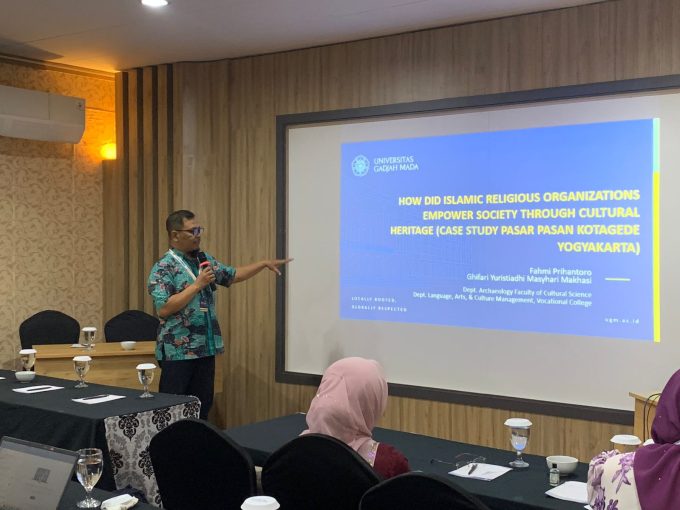
Yogyakarta, July 1, 2025 — The 4th International Seminar on Malay-Javanese Studies (SEMEJA) was officially held at UC Hotel, Universitas Gadjah Mada (UGM), bringing together scholars from various institutions both domestically and internationally. One of the panel speakers contributing to the academic discussions was Dr. Fahmi Prihantoro, S.S., M.A., a lecturer from the Department of Archaeology, Faculty of Cultural Sciences, UGM.
In a session titled “How Did Islamic Religious Organizations Empower Society Through Cultural Heritage,” Dr. Fahmi presented a case study on Pasar Pasan in Kotagede, Yogyakarta. He elaborated on how cultural heritage preservation can become a dynamic tool for community empowerment, particularly through the involvement of Islamic organizations such as Muhammadiyah.
According to Dr. Fahmi, Kotagede is a living heritage site—a cultural heritage area that continues to be actively used in the daily lives of its community. Beyond preserving historical traces, this area serves as a space where cultural, religious, and economic values develop harmoniously.
A key point in his presentation highlighted a paradigm shift in heritage preservation—from being government-led to being increasingly driven by civil society and non-governmental organizations. Muhammadiyah, as one of Indonesia’s largest Islamic organizations, was cited as having taken an active role in community development rooted in cultural heritage in Kotagede.
Through the Pasar Pasan case study, Dr. Fahmi emphasized how this traditional market activity functions as a platform for residents to reinforce cultural identity while simultaneously enhancing the local economy. Pasar Pasan is seen as a community-led initiative that integrates cultural values with inclusive economic practices.
The discussion also addressed the importance of community engagement and collective memory in sustaining cultural heritage. The people of Kotagede are considered to possess a strong historical awareness, which supports the continued existence of heritage spaces—especially those located between the symbolic twin gates of Kotagede.
The session concluded with an interactive Q&A segment. Seminar participants raised insightful questions, which Dr. Fahmi responded to enthusiastically, underlining the significance of collaboration among communities, academics, and religious organizations in preserving cultural heritage.
This event plays a crucial role in supporting the achievement of several Sustainable Development Goals (SDGs). Through community-based cultural heritage preservation, it contributes to the creation of inclusive, safe, resilient, and sustainable cities and human settlements, in line with SDG 11. Furthermore, educational values are promoted through the cross-cultural dissemination of knowledge and the strengthening of cultural identity awareness, reflecting the aims of SDG 4 on quality education. Equally important, the seminar embodies the spirit of SDG 17 by fostering strategic partnerships between academia, civil society, and local communities in social development based on local wisdom.
Through this discussion, participants gained new insights into community-based cultural preservation and the vital role of religious organizations in fostering inclusive and sustainable social development.
[Public Relations FIB UGM, Alma Syahwalani]

